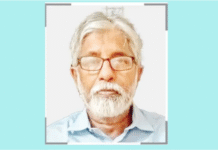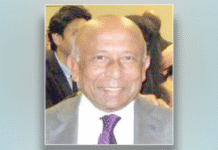Masuda Bhatti
It is not clear what the character of the state is even after more than four decades of its birth. Bangladesh is, rather, at the crossroads of Islamism and secularism
Hacking down four atheist bloggers in the last two years brought Bangladesh to the world’s headlines. In a couple of days, there may be another name in these headlines. A spokesman from the Bangladeshi security agency says that there are not only bloggers, but writers and secular politicians also on the hit-list of Islamist groups.
It seems as if the country is no longer safe for free-thinkers. At least, that is what my Facebook friends are thinking. And nowadays, I choose these friends with great caution as I myself have been attacked online since I started writing for Bangladeshi newspapers. I cannot begrudge my friends their anxiety about my security.
In February 2015, a Bangladeshi-US atheist blogger was hacked to death and Prime Minister Sheikh Hasina could not give condolences to the family in public because of the volatile political situation in Bangladesh. Mentioning this in an interview with Reuters, the son of the prime minister and advisor, Sajeeb Wazed Joy, said there were people who always wanted to prove that AL was atheistic.
In Bangladesh, this is the worst-case scenario for any party contesting an election, where voters are motivated by the religious actions taken by political parties. Many feathers were ruffled at Joy’s comments, and many think this will encourage the Islamists to kill even more.
To understand Mr Sajeeb Wazed Joy’s stance, we have to go back to the country’s past. Achieving independence from Pakistan in 1971 was an unprecedented event for the Bengali nation. Soon after, the founding father, Sheikh Mujibur Rahman, presented a constitution praised by the democratic and secular world for including four principles: Bengali Nationalism, democracy, socialism, and secularism.
He also banned the political parties based on religion such as Jamaat-e-Islami, who not only opposed the country’s independence, but was also involved in the genocide — together with the Pakistani military — of 3 million Bengalis and the rape of 200,000 Bengali women. Sheikh Mujib was, of course, later brutally killed along with his family members, except for his two daughters who were in Germany at the time.
After his death, however, Bangladesh started running exactly as Mujib had not envisioned it. The first military ruler of Bangladesh, General Ziaur Rahman, changed the four principles of the constitution by military ordinance. He threw out secularism, socialism, and Bengali Nationalism from the constitution, and gave the permission to religion-based political parties to do politics in the name of multi-party democracy.
Therefore, parties like Jamaat-e-Islami, whose leaders were exiled in Pakistan, Saudi Arabia or elsewhere, came back to Bangladesh. General Zia himself formed a political party from cantonment with the help of the leaders of China-supported socialist parties. Many religious leaders and ex-government and army officials also joined his party. The BNP, whose power relied on the military, on religion, and bureaucracy, became the main opponent of Sheikh Mujib’s secular and democratic AL, whose leadership went to his daughter, Sheikh Hasina, in the 1980s.
After the assassination of Ziaur Rahman, General Ershad took power and declared Islam the religion of the state, instantly forcing the people of other religions to become second-class citizens by default. He also formed another political party, the Jatiya Party, and, like General Zia, he had the same political ideology, except this time he included the business tycoons of the country in his party.
In Bangladesh, there are many religion-based political parties, among which radical Islamist parties also exist. It is worth mentioning that none of these religion-based parties boast a connection to any religion other than Islam, and most of them are allied with the BNP-led 20-party alliance against the AL.
Moreover, in 2001, when the BNP and Jamaat-led government was in power, several Islamist groups came out of the woodwork, such as Ansarullah Bangla Bhai, Harqat-ul-Zihad, and others. In 2005, there were at least 300 bomb blasts throughout Bangladesh, and other bomb blasts in cinema halls and cultural programs caused many casualties.
Much of the foreign media, including Time Magazine and the Far Eastern Economic Review, reported on the existence of Islamic terrorism in Bangladesh. But the BNP-Jamaat led government denied this and blamed the media for defaming Bangladesh. The Bangladeshi people were terrified by these acts of terrorism. But not many protests were held against it, and, in the 2008 election, more than 30% of votes went to the BNP-Jamaat-led alliance, who were in support of religious extremism in the country. There is no doubt about why many independent researchers claim that religious fanaticism is an increasing reality in Bangladesh.
Till now, the AL is the lone soldier against this increasingly strong extremist current. There are some leftist political forces who have also tried to raise their voice against them, but they do not have public support. Coming to power in 2008, Sheikh Hasina initiated the ICT to bring those perpetrators to justice, the ones who committed crimes against humanity in 1971, most of whom are members of Jamaat and BNP.
This decision, which betrays her pro-capital punishment stance, has been picked up by international media outlets such as the BBC and Al-Jazeera, deeming Hasina a religious leader. She narrowly escaped several attacks on her herself, including a grenade attack in 2004 which killed 24 of her party members.
The situation has become crucial for her and her party. If she or any other member of her party criticises any Islamist act, then her party is blamed for being anti-Islam. Recently, a cabinet member of AL made a comment on pilgrimages to Mecca, explaining that poor people do not need to go for Hajj as it is unnecessary expenditure. Subsequently, the Bangladeshi mainstream and social media were stormed by criticism of his words.
There were thousands of cases filed against him for defaming Islam; he was ousted from the cabinet and ended up in jail. The court hearing is ongoing. On the other hand, if Sheikh Hasina or any member of her party says something slightly in favour of Islam — for example, the aforesaid interview of her son (and advisor) with Reuters — the secularists will blame her and her party for being supporters of extremism. It has become quite the dilemma for the AL.
What is Bangladesh then? A secular state? No, by its constitution it is not. A religious state? Not really, as a secular force like the AL is still ruling the country. However, it is not clear what the character of the state is even after more than four decades of its birth. Bangladesh is, rather, at the crossroads of Islamism and secularism. The country is strongly divided, but one can argue that the supporters of Islamism will supersede secularism.
They can give evidence of the country’s 35,000 Islamic institutions, commonly known as madrasas, whose more than 20 million students and teachers will never vote for secularism. And one can easily predict that there are more of these religious-minded people within the government itself, and in our police force and army, and even in the AL, and when the time comes, they may very well stand against their own.
It is necessary to keep religious extremism out of Bangladesh for the stability of South Asia, as often Bangladesh is called the gateway of this region. But it is not just the responsibility of Sheikh Hasina and her party. It is the responsibility of others too. Then again, who else would be willing to come forward to volunteer their lives for this risky cause?
We can be happy blaming Sheikh Hasina, her son, or her party for compromising with the extremists, but this is also very true that only her government has had success tackling religious jingoists. However, the truth remains that our nation has become fertile ground for growing Islamic fanaticism over the last four-and-a-half decades, and we, as citizens, are cohabiting with Islamic extremism.
Source: Dhaka Tribune










